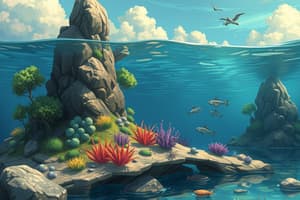Podcast
Questions and Answers
Are producer and autotroph synonyms or antonyms?
Are producer and autotroph synonyms or antonyms?
False (B)
Are specialist and generalists synonyms or antonyms?
Are specialist and generalists synonyms or antonyms?
False (B)
Are biotic and abiotic synonyms or antonyms?
Are biotic and abiotic synonyms or antonyms?
False (B)
Are consumer and heterotroph synonyms or antonyms?
Are consumer and heterotroph synonyms or antonyms?
Are chemosynthesis and photosynthesis synonyms or antonyms?
Are chemosynthesis and photosynthesis synonyms or antonyms?
Are herbivores and carnivores synonyms or antonyms?
Are herbivores and carnivores synonyms or antonyms?
Why is an herbivore always a primary consumer?
Why is an herbivore always a primary consumer?
Define keystone species and give an example.
Define keystone species and give an example.
Most humans are omnivores. What would be the exception to this?
Most humans are omnivores. What would be the exception to this?
Describe one meal that would make a human a primary and secondary consumer.
Describe one meal that would make a human a primary and secondary consumer.
What is the importance of decomposers in our ecosystem?
What is the importance of decomposers in our ecosystem?
Name two kinds of decomposers.
Name two kinds of decomposers.
Is wind abiotic or biotic?
Is wind abiotic or biotic?
Is soil abiotic or biotic?
Is soil abiotic or biotic?
Is fungus abiotic or biotic?
Is fungus abiotic or biotic?
Is an eagle abiotic or biotic?
Is an eagle abiotic or biotic?
Is temperature abiotic or biotic?
Is temperature abiotic or biotic?
Is sunlight abiotic or biotic?
Is sunlight abiotic or biotic?
Is snow abiotic or biotic?
Is snow abiotic or biotic?
Is water abiotic or biotic?
Is water abiotic or biotic?
Is bacteria abiotic or biotic?
Is bacteria abiotic or biotic?
Which word doesn't belong? Consumer / Carnivore / Plant. Why?
Which word doesn't belong? Consumer / Carnivore / Plant. Why?
Which word doesn't belong? Detritivore / Producer / Decomposer. Why?
Which word doesn't belong? Detritivore / Producer / Decomposer. Why?
Which word doesn't belong? Omnivore / Autotroph / Herbivore. Why?
Which word doesn't belong? Omnivore / Autotroph / Herbivore. Why?
Which word doesn't belong? Trophic level / Food chain / Keystone species. Why?
Which word doesn't belong? Trophic level / Food chain / Keystone species. Why?
Could producers survive without consumers?
Could producers survive without consumers?
What danger does a specialist face that a generalist does not?
What danger does a specialist face that a generalist does not?
What is one similarity and one difference between chemosynthesis and photosynthesis?
What is one similarity and one difference between chemosynthesis and photosynthesis?
How can one individual be part of a population, a community, an ecosystem, and a biome?
How can one individual be part of a population, a community, an ecosystem, and a biome?
Study Notes
Synonyms and Antonyms
- Producer and autotroph are synonyms, both referring to organisms that make their own food.
- Specialist and generalists are antonyms; specialists focus on specific food sources while generalists consume a variety.
- Biotic and abiotic are antonyms; biotic refers to living components, while abiotic refers to non-living factors in an ecosystem.
- Consumer and heterotroph are synonyms; both describe organisms that obtain food by consuming other organisms.
- Chemosynthesis and photosynthesis are antonyms; chemiosynthesis relies on chemical energy, whereas photosynthesis harnesses sunlight.
- Herbivores and carnivores are antonyms; herbivores eat plants, while carnivores consume meat.
Consumers and Ecosystems
- An herbivore is always a primary consumer because it feeds solely on plants, with no other organisms consumed prior.
- Keystone species play a crucial role in their ecosystem; an example is a beaver, whose activities significantly impact the environment.
Human Diets and Consumption
- Most humans are omnivores, but exceptions include vegetarians and vegans who avoid animal products.
- A hamburger with lettuce exemplifies a meal with both primary (lettuce) and secondary (hamburger) consumers.
Role of Decomposers
- Decomposers are vital for ecosystems as they break down dead organic matter, recycling nutrients.
- Examples of decomposers include termites and mushrooms, which contribute to nutrient cycling.
Abiotic and Biotic Factors
- Wind, soil, temperature, sunlight, snow, and water are classified as abiotic factors, meaning they are non-living elements of the environment.
- Fungus and bacteria are biotic factors, representing living organisms in an ecosystem.
Categories and Classification
- In the context of consumers, "plant" does not belong among consumer/carnivore categories as it is not a consumer.
- "Producer" doesn't belong with detritivore and decomposer because it does not consume food, performing a different ecological role.
- In the omnivore/autotroph/herbivore trio, autotrophs are distinct as they only consume sunlight or inorganic materials.
- Among trophic level, food chain, and keystone species, the keystone species is unique as it relates specifically to the role of certain organisms within food webs.
Survival and Population Dynamics
- Producers can survive independently of consumers as they do not rely on other organisms for sustenance.
- Specialists face higher risks than generalists; if a specialist's specific food source becomes extinct, it can endanger its survival.
Chemosynthesis vs. Photosynthesis
- Both chemosynthesis and photosynthesis are processes utilized by autotrophs; however, chemosynthesis relies on chemically derived nutrients while photosynthesis uses sunlight for energy.
Ecological Hierarchy
- An individual organism belongs to multiple ecological categories: it is part of a species, that species is part of a population, populations form communities, and communities interact in ecosystems within specific biomes.
Studying That Suits You
Use AI to generate personalized quizzes and flashcards to suit your learning preferences.
Description
Test your knowledge on synonyms and antonyms related to ecosystems and consumers in biology. This quiz will help you understand key concepts such as producers, consumers, and the roles of various organisms. Enhance your vocabulary and grasp of ecological relationships.




